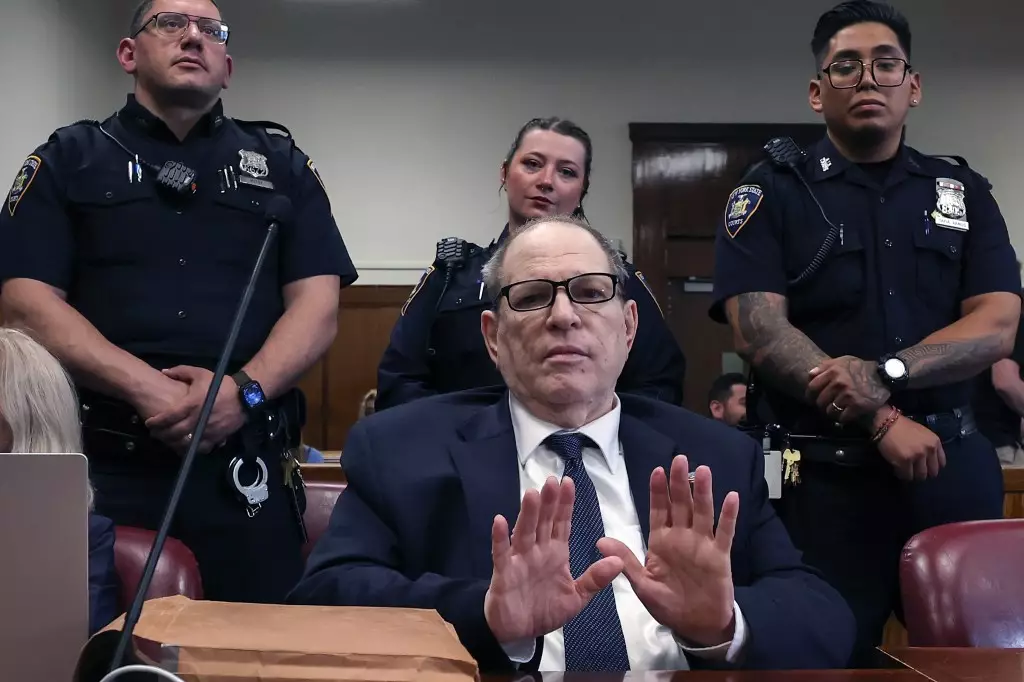In the labyrinthine world of celebrity trials, few cases have garnered as much media attention or public outrage as that of Harvey Weinstein. Once a titan of Hollywood, his fall from grace has become a modern cautionary tale, embodying the tumultuous shifts in societal norms regarding sexual misconduct. Weinstein’s current retrial in New York, following a series of serious allegations that shattered his empire, is emerging as a pivotal moment not only for his life but also for the broader narrative surrounding the #MeToo movement. With mounting pressures, Weinstein’s decision to remain silent instead of testifying offers intriguing insights into his legal strategy and the nature of justice in a high-stakes environment.
A Calculated Silence in the Face of Judgement
Initially, there were fears expressed by Weinstein’s attorneys that their client, at 73 and with health issues, might not survive the rigors of another trial. Yet, as the retrial unfolds, it appears that his defense is taking a more measured approach by opting not to let him testify. This choice seems rooted in the belief that confronting the court could open the floodgates to scrutiny, potentially dragging past, unrelated allegations into the spotlight that might irreparably damage his case. His spokesperson, Juda Engelmayer, emphasized this cautious stance, suggesting that the potential for derailment was too great. In a climate where public sentiment is often swayed by emotion rather than fact, such a strategic retreat raises crucial questions about the efficacy of justice in such high-profile cases.
Defying Expectations in the Courtroom
As the prosecution gears up for closing arguments, the defense strategy, orchestrated by attorney Arthur Aidala, appears to pivot toward cultivating a narrative of mutual consent rather than outright denial of the incidents. By framing Weinstein’s interactions with his accusers—Jessica Mann, Miriam Haley, and Kaja Sokola—as “friends with benefits,” Aidala aims to sow doubt about the prosecutors’ portrayal of events. This narrative serves not only to humanize Weinstein but also to grapple with evolving interpretations of consent in a post-#MeToo landscape. The trial thus represents a battleground for competing societal narratives about power, accountability, and sexual dynamics in the workplace.
The Role of Public Image and Media Manipulation
Despite his physical absence from the stand, Weinstein’s narrative is being carefully curated through external channels. Following a controversial jailhouse interview with right-wing commentator Candace Owens, it becomes evident that Weinstein is not shying away from public discourse. His insistence on being “wrongfully accused” and his plea for a distinction between morality and legality speak volumes about his strategy: to reclaim and reshape his public image as a victim of overreach rather than a perpetrator. This particular PR campaign seems deceptively intricate, capitalizing on divisive media narratives to galvanize support from specific demographics that resonate with his plight.
Implications of a Lingering Legal Battle
As Weinstein contends with the specter of a retrial, the larger implications ripple through the fabric of American society. Should the jury’s decision lean toward guilt once more, his potential to serve additional time casts a long shadow over his future. Imprisoned already for a 2022 conviction in Los Angeles, the ramifications of a guilty verdict in New York could solidify a grim legacy—not merely of personal disgrace but also as a potent reminder of the pervasive issues of abuse and accountability within elite circles. This ongoing saga starkly illustrates the complicated interplay between celebrity status and the legal system, as well as the potential for reform sparked by the public’s reaction to these high-profile abuses of power.
The spotlight on Weinstein’s case ultimately reflects the societal reckoning with power dynamics, consent, and justice. As the jury prepares for deliberations, questions linger not only about Weinstein’s fate but also about the evolving attitudes towards accountability in an industry that often shields its powerful figures from the repercussions of their actions.


Leave a Reply